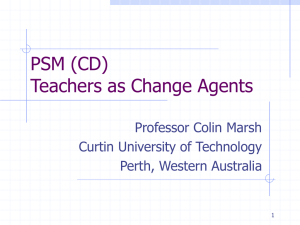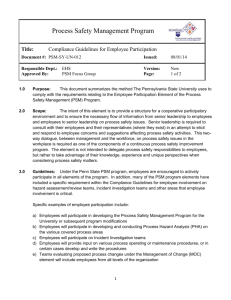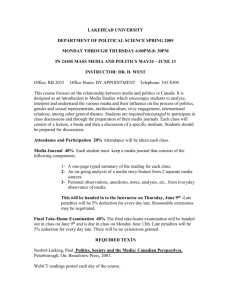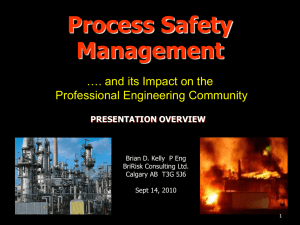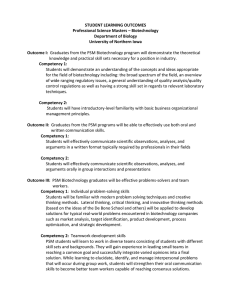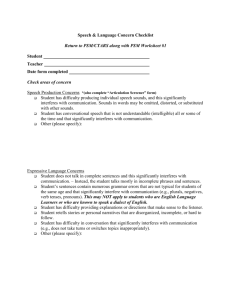STUDENT OUTCOMES ASSESSMENT PLAN Professional Science Masters Industrial Mathematics
advertisement
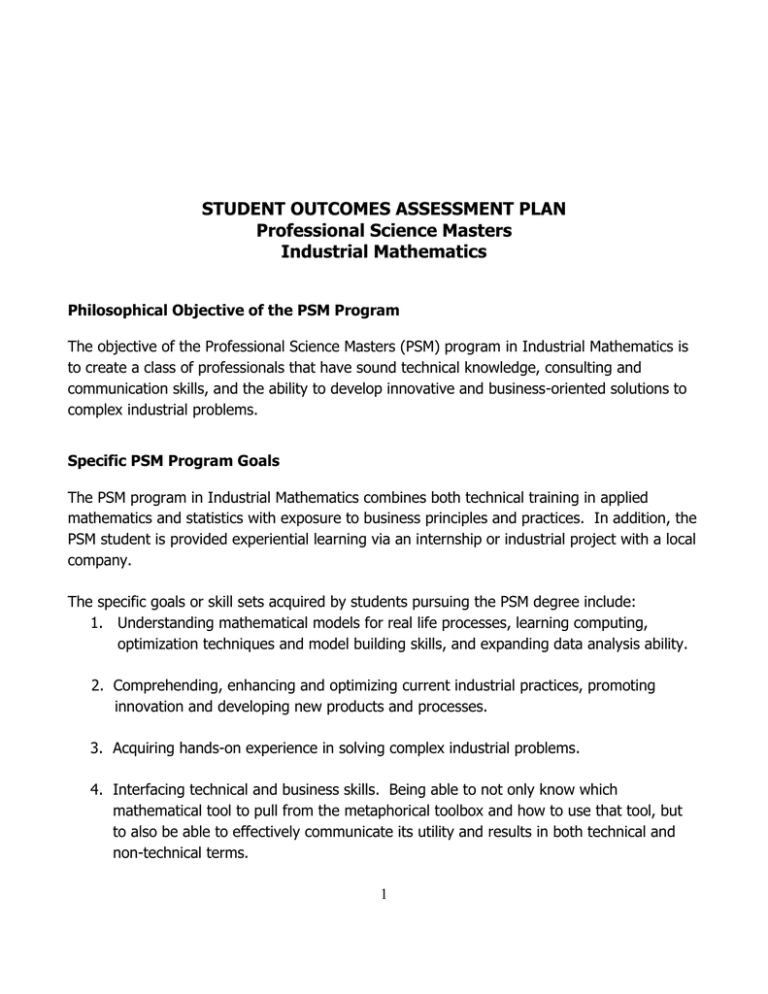
STUDENT OUTCOMES ASSESSMENT PLAN Professional Science Masters Industrial Mathematics Philosophical Objective of the PSM Program The objective of the Professional Science Masters (PSM) program in Industrial Mathematics is to create a class of professionals that have sound technical knowledge, consulting and communication skills, and the ability to develop innovative and business-oriented solutions to complex industrial problems. Specific PSM Program Goals The PSM program in Industrial Mathematics combines both technical training in applied mathematics and statistics with exposure to business principles and practices. In addition, the PSM student is provided experiential learning via an internship or industrial project with a local company. The specific goals or skill sets acquired by students pursuing the PSM degree include: 1. Understanding mathematical models for real life processes, learning computing, optimization techniques and model building skills, and expanding data analysis ability. 2. Comprehending, enhancing and optimizing current industrial practices, promoting innovation and developing new products and processes. 3. Acquiring hands-on experience in solving complex industrial problems. 4. Interfacing technical and business skills. Being able to not only know which mathematical tool to pull from the metaphorical toolbox and how to use that tool, but to also be able to effectively communicate its utility and results in both technical and non-technical terms. 1 Mechanisms for Outcomes Assessment – Assessment Methods, Frequency of Assessments and Processes for Evaluating and Interpreting Results The PSM program in Industrial Mathematics is especially reactionary to changes in the business environment, given its charge to produce quantitatively skilled individuals for work in local Iowa businesses. When a company communicates that a particular skill set is critical to their needs (either directly to PSM faculty or indirectly to students working on their projects), the PSM program will adapt to meet that need through curriculum changes, specific course adjustments, changing expectations placed upon the students, etc. Each Mechanisms for Outcomes Assessment (below) is designed to add a layer of knowledge needed to improve the quality of teaching and learning in the Industrial Mathematics PSM program. A) INDIVIDUAL COURSE PROFICIENCIES This proficiency addresses the first three PSM Specific Program Goals and first three Student Outcomes and Competencies – Student Learning goals from the Student Learning Outcomes (SLO) for the PSM Industrial Mathematics Program. In particular, it specifically targets PSM Specific Program Goal #1 and SLO Student Outcome and Competency #1. A student’s demonstration of learning the material (developing the tools in her/his toolbox) are perhaps best manifested with the work that she/he produces in each class. We will ask PSM students to provide copies of tests and/or project papers (measurable outcomes) that they consider to be their best work during their program of study. Their instructor’s evaluation of each measurable outcome is, without question, relevant given that our fundamental charge is to assess: What should students learn? How well are they learning it? and How does the institution know? The score on each individual measurable outcome is the obvious metric to decide whether this individual measurable outcome is in concordance with the stated objectives provided to the student before he/she takes the test or complete the project paper. The student was given a set of criteria to meet; the instructor is in the best position to evaluate how well the student 2 met the criteria. This is a course specific goal; but nevertheless, lays the foundation to our layer of knowledge needed to improve the quality of teaching and learning. The analogy in business is having the worker’s immediate supervisor provide feedback in the form of a performance evaluation, as to how well the worker satisfied the expectations of him/her; the boss is in the best position to decide if the worker is getting the job done. The instructor sets the bar and directly evaluates how well the student clears (or does not clear) the bar. As a second, wider level of feedback on the individual course proficiency measurable outcome, PSM faculty will annually examine the provided measurable outcomes to assess whether the individual instructor’s expectations and the student’s performance is in agreement with the stated goals and objectives of the PSM program. This second layer of feedback to this particular individual course proficiency serves the broader PSM program goals (in contrast to the individual course goals given by the evaluation by just the individual course instructor) by evaluating three critical areas of student achievement. These three areas include: Discipline-related content knowledge Higher-order skills such as critical thinking and problem solving Writing proficiency PSM faculty will decide if the collection of individual course proficiencies is in concordance with stated philosophical objective and specific goals of the PSM program, and will identify general deficiencies to take action to remedy. This SOA outcome is measurable from any time point in the student’s academic program of study. B) INTERNSHIP SUMMARY PAPER AND SURVEY This proficiency addresses all four PSM Specific Program Goals and all four Student Outcomes and Competencies – Student Learning goals from the Student Learning Outcomes (SLO) for the PSM Industrial Mathematics Program. In particular, it specifically targets PSM Specific Program Goal #2 and SLO Student Outcome and Competency #2. We will ask each PSM student to provide a report that summarizes the internship experience and reflects on the learning opportunities presented (or failed to present). This report 3 includes a description of their internship or experience with the company, the nature of their mathematical and/or statistical research together with their proposed solution to the problem. Their solution may be more fully developed in their final research paper and only needs to be succinctly outlined in this measurable outcome. The PSM internship/project summary paper for industry serves as a mechanism for outcomes assessment, in that it gives the student the opportunity to apply her or his skills in a real world situation. They will get first-hand knowledge of the practical applicability of the mathematical and statistical tools that they have learned in the classroom. They will have the opportunity to see the ‘big picture’ and how relevant and feasibly their ideas are in a company setting. Additionally we will survey the student’s internship supervisor. Again, the boss is in the best position to assess the worker’s performance. We will compare the student’s stated results with the employer’s expectations. We will examine what aspects of the PSM program (curriculum, methodologies, oral, written, interaction skills of the student, etc) were performed well and which ones are in need of improvement. This SOA outcome is measurable after the student completes her/his internship and/or the Industrial Internship/Project (800:275) class. C) RESEARCH PAPERS This proficiency addresses all four PSM Specific Program Goals and all four Student Outcomes and Competencies – Student Learning goals from the Student Learning Outcomes (SLO) for the PSM Industrial Mathematics Program. In particular, it specifically targets PSM Specific Program Goal #3 and SLO Student Outcome and Competency #3. The PSM in Industrial Mathematics degree requires the submission of a research or industrial project paper to the Graduate College. This required paper provides perhaps the broadest opportunity to examine the student's ability to conduct independent research and convey the findings clearly both orally and in writing. Outcomes assessment relative to the research paper consists of ongoing quality control measures, to ensure that student research papers reflect the skills and abilities outlined above. These quality assurance measures include: We will continue to offer the six credit Industrial Internship/Project (800:275) course in which PSM students work on their project papers under the guidance of an instructor. 4 The result is a much better quality paper than one derived from another course or produced hurriedly in the student's final semester. The student will make a presentation of their project paper to both the company for which they have been assisting and also to the Mathematics Department at the University of Northern Iowa. PSM faculty will be able to directly evaluate the appropriateness and competency of the analysis. This SOA outcome is measurable after the student completes her/his project paper and makes her/his final project presentation. D) ALUMNI EVALUATION This proficiency addresses all four PSM Specific Program Goals and all four Student Outcomes and Competencies – Student Learning goals from the Student Learning Outcomes (SLO) for the PSM Industrial Mathematics Program. In particular, it specifically targets PSM Specific Program Goal #4 and SLO Student Outcome and Competency #4. As an additional outcomes assessment, we will carry out a biennial survey of alumni, to learn about their career paths, and ask them to reflect on the applicability of the skills acquired in their graduate program to their professional activities and to their life activities. We are specifically looking for what skill sets are most valuable in industry and how well are we currently integrating these skills into our curriculum. This SOA outcome is measurable after the student graduates and has been working in industry. 5
